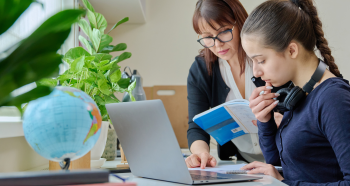Are you looking for teaching ideas for Physics for the IB Diploma? Then take a look at our blog post from experienced teacher and author Andreas Tsokos. Andreas is an author from our Physics for the IB Diploma series and a retired IB teacher from Athens and Copenhagen. He has taught physics and maths for 32 years.
In his blog post Andreas looks at the challenges IB teachers face, what skills students should have before starting Physics for the IB Diploma, how to prepare for the Internal Assessment, how students can have success in their studies, what skills would be useful to students for further study at university and his top three tips for new teachers.
You can listen to Andreas discussing these ideas with fellow author and teacher Brenda Walpole in our Brighter Thinking Podcast episode ‘Developing essential skills for IB Sciences’. You can read Brenda’s latest post here. You can also watch Andreas’s webinar on teaching Physics for the IB Diploma and download his webinar presentation.
Challenges for IB teachers
All teaching is a challenge since each student learns in different ways, and the teacher must adapt to find the right approach for each student. But teaching the IB Diploma has the extra challenges of a vast syllabus and a complicated exam structure, where attention must be paid to command terms and a tricky set of multiple-choice questions.
Skills students should have before starting IB Physics
An introductory physics course is a good thing for students to have as well as basic lab skills and the ability to write a decent lab report. But perhaps more important than all is facility with basic algebra and arithmetic: changing the subject of an equation, dividing fractions by fractions, predicting how y will change when x changes. This may sound trivial but it is remarkable how these skills will gain students lots of points, especially on the multiple-choice part of the exam. Conversely, it is remarkable how lack of these skills makes IB Physics difficult for so many students.
How do students prepare for the IA (Internal Assessment)?
Obviously students need a solid and well-structured experimental programme and lots of practice with the criteria (not all of which need to be assessed in every report). It is a good idea for all students to do the same practice (mock) IA and then grade each other’s report. It is amazing how many good ideas will be generated, especially for the Evaluation criterion, which students find the hardest to tackle.
How can students be successful in IB Physics?
Students should practise past exam questions as early as possible (the end of the first week of the course is a good time to start!).
They should pay particular attention to multiple-choice questions. There is a general feeling that they are easy (and one can guess!) but they are not. They can be confusing and there may be a play on words.
Students should get used to command terms and understand that the level of detail required in the answer is determined by the command term.
They need to understand the definitions of basic terms.
They need to understand the limitations of formulas – when they can and cannot be applied.
What skills will be useful for further study of physics at university?
Perseverance and resilience! The data students collected in a lab do not make sense: they cannot give up, they must collect new data. The algebra they did does not derive the required formula: they must do it again, more carefully. The number their calculator gives does not make sense: they must do it again. The level of difficulty of the problems they will have to solve at university and the complexity of labs is substantially higher than the level at IB Physics. In IB Physics a couple of lines of algebra will solve any problem but at university students may have to do pages of algebra to get a result. They must be prepared for this level of work.
What useful skills will a student carry away from IB Physics?
Even if students do not go on to further study science at university, a course in IB Physics will teach them valuable life skills including critical and logical thinking, a good sense of the magnitude of numbers, communication skills, collaboration skills and problem solving. These are developed through the content of the course, the Internal Assessment, the Group 4 project and the Extended essay.
Three tips for new teachers
- Learn the syllabus well and know what is on it and what is not on it.
- Practise with exam questions as early as possible.
- Join a group of IB Physics teachers such as the IB’s own platform My IB or Facebook groups. Participate and ask questions – there are many people who will immediately give good advice and answers.





